Related Research Articles
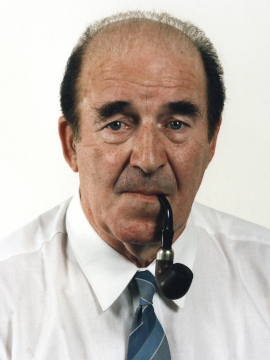
Neil Terence Columba Blaney was an Irish politician. He was first elected to Dáil Éireann in 1948 as a Fianna Fáil Teachta Dála (TD) representing Donegal East. A high-profile member of the party, Blaney served as a government minister several times; he was Minister for Posts and Telegraphs (1957), Minister for Local Government (1957–1966) and Minister for Agriculture and Fisheries (1966–1970). In 1970 Blaney's career was radically altered when, alongside Charles Haughey, he was involved in the Arms Crisis and stood accused of clandestinely arranging to provide weapons to the newly-emergent Provisional Irish Republican Army. Although later acquitted of wrongdoing in an Irish court, Blaney involvement in the crisis saw him stripped of his ministries and eventually forced his expulsion from Fianna Fáil. A dogged political campaigner, Blaney managed to retain his seat in Donegal and remained a TD for another two decades, running under the banner of "Independent Fianna Fáil". In addition to being a TD, Blaney also entered into European politics, becoming a member of the European Parliament in 1979. Blaney was a holder of both offices when he died in 1995. Entering the Dáil as its youngest member, he left it as the oldest member.
There were two governments in the 18th Dáil, which was elected at the 1965 general election held on 7 April 1965. Both were single-party Fianna Fáil governments, which had been in government since the 1957 election. The 11th government of Ireland was led by Seán Lemass as Taoiseach and lasted for 569 days. The 12th government of Ireland was led by Jack Lynch as Taoiseach and lasted for 966 days.

The 1977 Irish general election to the 21st Dáil was held on Thursday, 16 June, following the dissolution of the 20th Dáil on 25 May by President Patrick Hillery on the request of Taoiseach Liam Cosgrave. The general election took place in 42 Dáil constituencies throughout Ireland for 148 seats in Dáil Éireann, the house of representatives of the Oireachtas, an increase of four seats with a significant revision of constituencies under the Electoral (Amendment) Act 1974. The election is regarded as a pivotal point in twentieth-century Irish politics. Jack Lynch led Fianna Fáil to a landslide election win, clearly defeating the outgoing Fine Gael–Labour government.

The 1973 Irish general election to the 20th Dáil was held on Wednesday, 28 February 1973, following the dissolution of the 19th Dáil on 5 February by President Éamon de Valera on the request of Taoiseach Jack Lynch. The general election took place in 42 Dáil constituencies throughout Ireland for 144 seats in Dáil Éireann, the house of representatives of the Oireachtas.
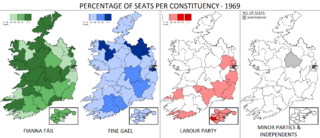
The 1969 Irish general election to the 19th Dáil was held on Wednesday, 18 June, following the dissolution of the 18th Dáil on 22 May by President Éamon de Valera on the request of Taoiseach Jack Lynch. The general election took place in 42 Dáil constituencies throughout Ireland for 144 seats in Dáil Éireann, the house of representatives of the Oireachtas, with boundary changes under the Electoral (Amendment) Act 1969. The governing Fianna Fáil won its fourth successive election.
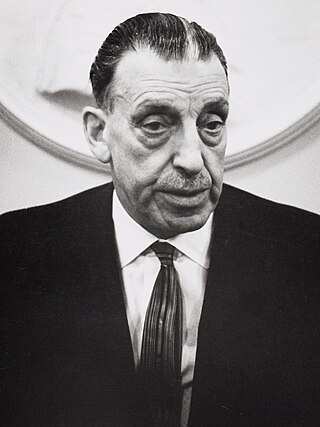
The 1965 Irish general election to the 18th Dáil was held on Wednesday, 7 April, following the dissolution of the 17th Dáil on 18 March by President Éamon de Valera on the request of Taoiseach Seán Lemass. The general election took place in 38 Dáil constituencies throughout Ireland for 144 seats in Dáil Éireann, the house of representatives of the Oireachtas. The governing Fianna Fáil saw a slight increase, though did not obtain a majority.
The Ninth Amendment of the Constitution Act 1984 is an amendment to the Constitution of Ireland that allowed for the extension of the right to vote in elections to Dáil Éireann to non-Irish citizens. It was approved by referendum on 14 June 1984, the same day as the European Parliament election, and signed into law on 2 August of the same year.
In Ireland, direct elections by universal suffrage are used for the President, the ceremonial head of state; for Dáil Éireann, the house of representatives of the Oireachtas or parliament; for the European Parliament; and for local government. All elections use proportional representation by means of the single transferable vote (PR-STV) in constituencies returning three or more members, except that the presidential election and by-elections use the single-winner analogue of STV, elsewhere called instant-runoff voting or the alternative vote. Members of Seanad Éireann, the second house of the Oireachtas, are partly nominated, partly indirectly elected, and partly elected by graduates of particular universities.

Clare is a parliamentary constituency represented in Dáil Éireann, the lower house of the Irish parliament or Oireachtas. The constituency elects four deputies on the system of proportional representation by means of the single transferable vote (PR-STV).
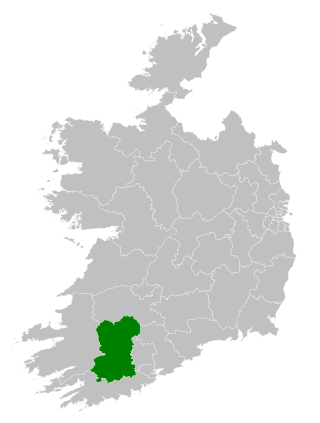
Cork North-West is a parliamentary constituency represented in Dáil Éireann, the lower house of the Irish parliament or Oireachtas. The constituency elects 3 deputies on the system of proportional representation by means of the single transferable vote (PR-STV).
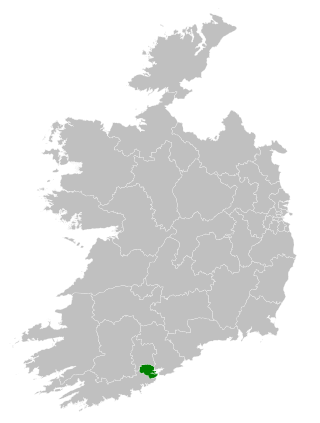
Cork South-Central is a parliamentary constituency represented in Dáil Éireann, the lower house of the Irish parliament or Oireachtas. The constituency elects 4 deputies on the system of proportional representation by means of the single transferable vote (PR-STV).

Cork North-Central is a parliamentary constituency represented in Dáil Éireann, the lower house of the Irish parliament or Oireachtas. The constituency elects 4 deputies on the system of proportional representation by means of the single transferable vote (PR-STV).
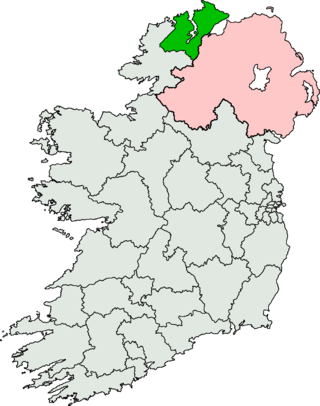
Donegal North-East was a parliamentary constituency represented in Dáil Éireann, the lower house of the Irish parliament or Oireachtas, from 1961 to 1977 and from 1981 to 2016. The constituency elected 3 deputies. The method of election was proportional representation by means of the single transferable vote (PR-STV).
Liam Ahern was an Irish Fianna Fáil politician who served in both Dáil Éireann and Seanad Éireann.
Cork North-East was a parliamentary constituency represented in Dáil Éireann, the lower house of the Irish parliament or Oireachtas from 1961 to 1981. The constituency elected 5 deputies to the Dáil until 1969, and then 4 thereafter. The method of election was proportional representation by means of the single transferable vote (PR-STV).

Liam de Róiste was an Irish Sinn Féin politician, diarist and Gaelic scholar.

Carlow–Kilkenny is a parliamentary constituency represented in Dáil Éireann, the lower house of the Irish parliament or Oireachtas. The constituency elects five deputies on the system of proportional representation by means of the single transferable vote (PR-STV).
Richard Valentine Jago was a politician and businessman in Cork city in Ireland. He was Secretary of the Cork Methodist Association in 1940, Lord Mayor of Cork from 1957 to 1958 when a member of the Cork Civic Party, and chairman of the Cork Chamber of commerce from 1964 to 1965.
The 1945 local elections in Ireland were held on 14 June 1945 to fill all council seats for most counties and county boroughs and municipal towns. The state was still under the Emergency of the Second World War. As a cost-saving measure, electoral law was amended to bring forward the date of the local elections a few weeks to coincide with the 1945 presidential election.
References
- Moran, John (1972). "Local Elections in Cork City (1929-1967)" (PDF). Journal of the Cork Historical and Archaeological Society: 124–133. Retrieved 15 September 2018.
Footnotes
- 1 2 Cló Iar-Chonnacht. "De Róiste, Liam (1882–1959)". Ainm.ie (in Irish). Fiontar. Retrieved 19 December 2013.
Bhuaigh sé suíochán i mBardas Chorcaí 1945 mar dhuine den Civic Party, dream a raibh baint ag Ridirí Cholumbáin leis.
- ↑ "Biographical History" (PDF). IE CCCA/U271: Liam de Róiste papers. Cork City and County Archives. p. 2. Retrieved 19 December 2013.
- ↑ Bhreatnach, Aoife (2006). Becoming conspicuous: Irish travellers, society and the state, 1922-70. University College Dublin Press. p. 55. ISBN 9781904558613 . Retrieved 19 December 2013.
- ↑ Blaney, Neil (27 March 1963). "Committee on Finance. - Electoral Bill, 1962: Committee Stage". Dáil Éireann (17th Dáil). pp. Vol.201 No.4 p.48 c.604. Retrieved 3 July 2023.
Let us have a look at the situation in Cork city when they fought a local election as one constituency with everybody up in a free-for all. ... We had 72 names on the ballot paper, out of which 21 were to be selected.
- ↑ Electoral Act 1963, s. 87: Electoral areas in certain county and other borough ( No. 19 of 1963, s. 87 ). Enacted on 12 July 1963. Act of the Oireachtas .Retrieved from Irish Statute Book on 18 December 2013.
- ↑ Cork County Borough Electoral Areas Order 1965 ( S.I. No. 249 of 1965 ). Signed on 13 December 1965by Neil Blaney , Minister for Local Government . Statutory Instrument of the Government of Ireland .Retrieved from Irish Statute Book on 17 December 2013.
- ↑ "Cork Civic Party ceases". The Irish Times. 4 February 1966. p. 8.
- ↑ "R. Valentine Jago". Members Database 1919 - 2013. Oireachtas. Retrieved 19 December 2013.